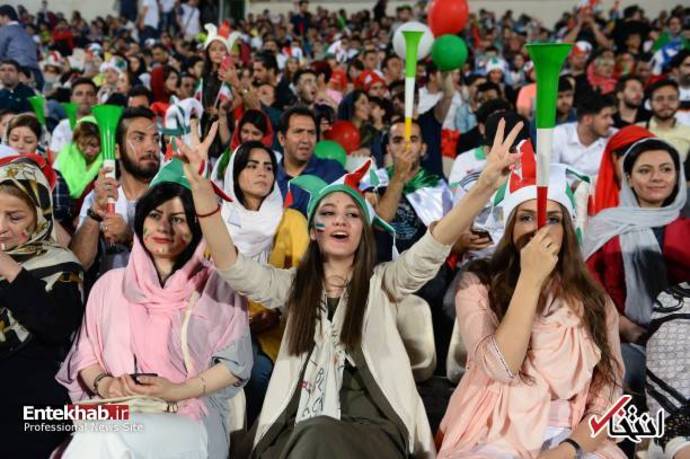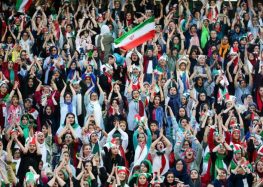Activists Welcome FIFA Deadline For Iran to Lift Discriminatory Ban on Women in Stadiums

Iran Only Country in the World That Bans Women From Football Stadiums
FIFA Human Rights Body Recommends Using “Existing Leverage” For Iran to Comply With Human Rights Statutes
November 27, 2018 – Heeding calls by women’s rights activists inside and outside Iran, governing football body FIFA has been urged in a new report by its advisory board to give the Islamic Republic a deadline to lift its ban on women in football stadiums.
The Open Stadiums campaign, which describes itself as a “movement of Iranian women seeking to end discrimination and let women enter stadiums,” welcomed the board’s recommendations on Iran as a “Great achievement for Iranian female football fans who insisted for their right to enter to stadiums for more than 13 years.”
Hadi Ghaemi, executive director of the Center for Human Rights in Iran (CHRI), which has been advocating against the ban for several years, also welcomed the recommendations while adding that Iranian women remain “well aware that their peaceful battle for equal rights isn’t over yet.”
“Throughout the years, Iran has fended off international pressure to lift this discriminatory ban by temporarily relaxing it,” he added. “That’s why it’s crucial for FIFA to implement its board’s recommendations and take all necessary steps to ensure that Iran complies with the human rights statutes.”
Some Iranian women rights activists who are not affiliated with the Open Stadiums campaign also registered their approval on social media.
“FIFA is supporting Iranian women’s rights by issuing an ultimatum to allow women into stadiums,” tweeted Azam Jangravi, one of the dozens of women who were arrested in Iran in 2018 for peacefully protesting against the state’s compulsory hijab law by removing their headscarves in public.
“Now it’s our turn to show our social power,” added Jangravi, who was arrested in February and has since left the country. “Let’s not forget that we are countless and dictators gain strength from our disunity and silence.”
The FIFA Human Rights Advisory Board’s report, published on November 26, 2018, recommends that FIFA be “explicit about the timeframe in which it expects its Member Association [Iran] to align with FIFA’s human rights expectations and the anticipated sanctions if it does not, including under the FIFA Statutes, Disciplinary Code and Ethics Code.”
Comprised of eight independent experts from the United Nations, trade unions, civil society and FIFA sponsors, the board also recommends using FIFA’s “existing leverage” regarding decisions about “upcoming tournaments where the Iranian Football Association is bidding since, by definition, this would pose challenges to FIFA meeting its own human rights responsibilities.”
Iran is the only country in the world that bans women from sports stadiums. The unofficial policy has been backed by religious conservatives and political hardliners in Iran since 1980, a year after the establishment of the Islamic Republic.
But Iran’s ban is a violation of FIFA’s own rules for teams that participate in international football events. Article 4 of FIFA’s statutes states that discrimination of any kind against a group of people is “strictly prohibited and punishable by suspension or expulsion.”
Activists Face Uphill Battle Against Decades-Long Ban
Iran relaxed its ban four times in 2018 thus far, twice by allowing a limited number of women to watch televised World Cup matches inside Tehran’s Azadi Stadium in the summer and also by allowing limited numbers of women to watch men’s soccer matches in the stadium in October and November.
The board noted these “positive developments” while warning that “these ad hoc decisions are obviously not the same as a formal end to the ban.”
The peaceful struggle against the ban has been inching forward throughout the decades in Iran despite the threat of arrest and imprisonment with various protest and campaign actions, including women entering Azadi Stadium dressed as men and celebrities calling on officials to lift the ban.
On March 2, FIFA President Gianni Infantino said Iranian President Hassan Rouhani had “promised” during a meeting in Tehran that women in Iran would “soon” be allowed to enter stadiums. But a day earlier, 35 women were arrested for trying to enter Tehran’s Azadi Stadium, where Infantino watched a soccer match.
Despite the promise, President Rouhani has not called for the ban to be lifted. Meanwhile conservative and hardline officials have registered their fierce opposition to women being allowed to enjoy football matches in the same stadium as men.
Immediately after a limited number of women were allowed into Azadi Stadium to watch a men’s home game in October 2018, Iran’s Attorney General Jafar Montazeri threatened to “confront” anyone who allows the “trend” to continue.
“It’s problematic when women looking at men’s half-naked bodies,” he said. “It undermines the country’s Islamic norms.”
“The media outlets that support women’s presence in the stadium should give a convincing answer to this problem,” he added. “I advise the officials that if this trend continues we will confront it because we should not be promoting sin and immorality.”
But some Iranians took to social media to express an opposing viewpoint, including Iranian celebrities who are expected to avoid making statements against state policies.
“Hoping for the day when half of Azadi (Stadium in Tehran) will be yours,” tweeted soccer player Hossein Mahini, a member of Iran’s national Team Melli.
“Iranian officials have made various ludicrous statements to justify the ban, including the already disproven claim that Iran’s stadiums aren’t safe for women,” said Ghaemi.
“Whatever their personal views, these officials should come to terms with the fact that the Iranian people, especially women, are committed to peacefully demanding their rights and aren’t backing down,” he added.






